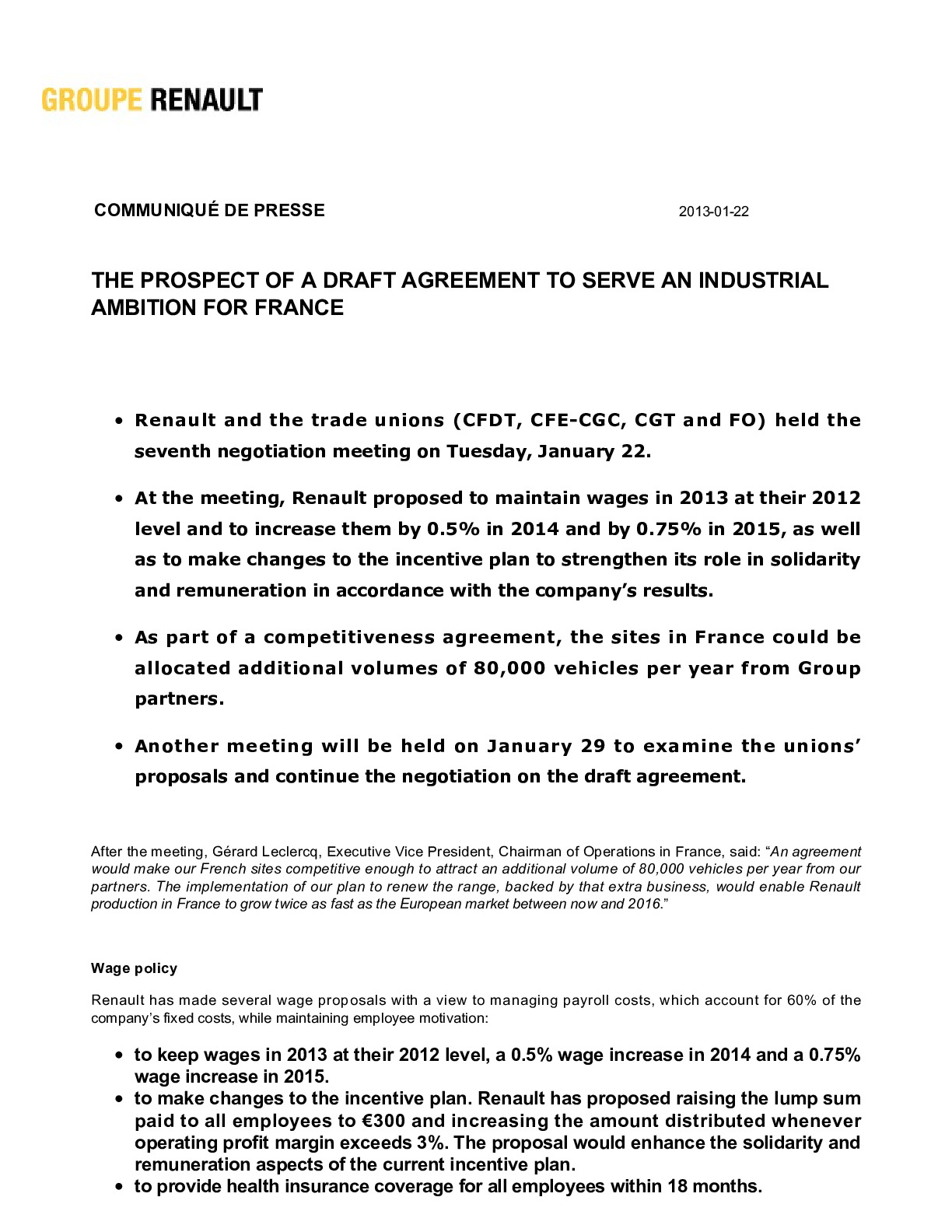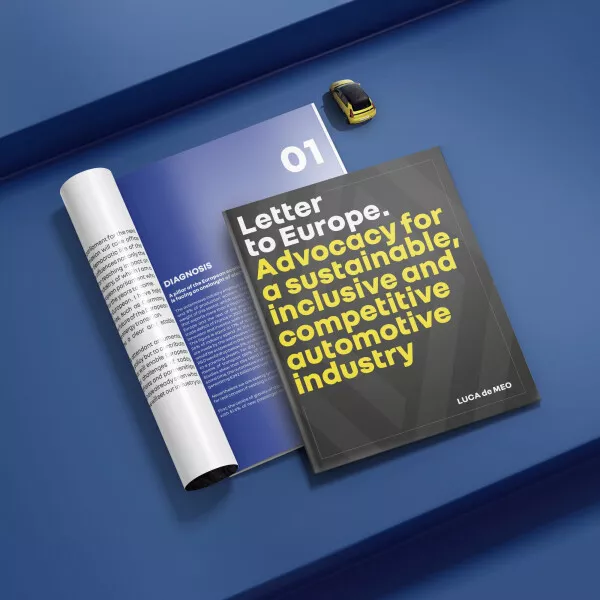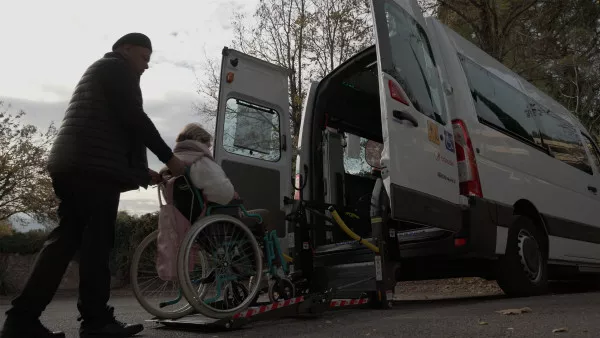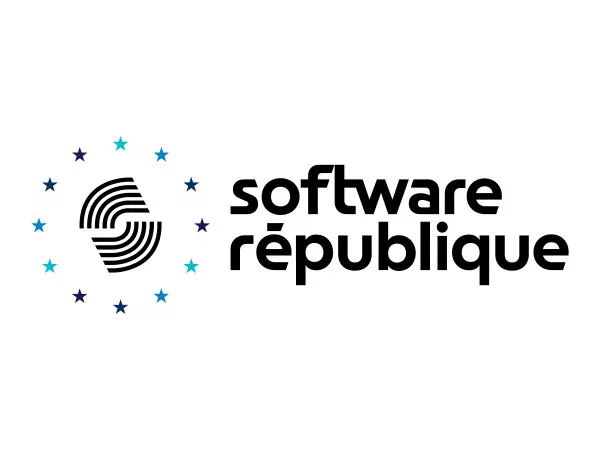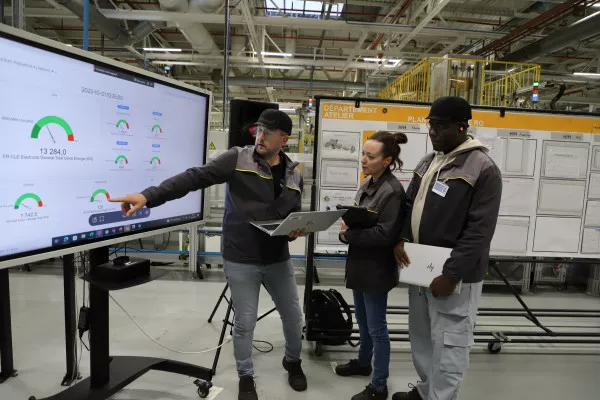The prospect of a draft agreement to serve an industrial ambition for France
22 January 2013 16:03
-
Renault and the trade unions (CFDT, CFE-CGC, CGT and FO) held the seventh negotiation meeting on Tuesday, January 22.
-
At the meeting, Renault proposed to maintain wages in 2013 at their 2012 level and to increase them by 0.5% in 2014 and by 0.75% in 2015, as well as to make changes to the incentive plan to strengthen its role in solidarity and remuneration in accordance with the company’s results.
-
A s part of a competitiveness agreement, the sites in France could be allocated additional volumes of 80,000 vehicles per year from Group partners.
-
A nother meeting will be held on January 29 to examine the unions’ proposals and continue the negotiation on the draft agreement.
After the meeting, Gérard Leclercq, Executive Vice President, Chairman of Operations in France, said: “ An agreement would make our French sites competitive enough to attract an additional volume of 80,000 vehicles per year from our partners. The implementation of our plan to renew the range, backed by that extra business, would enable Renault production in France to grow twice as fast as the European market between now and 2016 .”
Wage policy
Renault has made several wage proposals with a view to managing payroll costs, which account for 60% of the company’s fixed costs, while maintaining employee motivation:
- to keep wages in 2013 at their 2012 level, a 0.5% wage increase in 2014 and a 0.75% wage increase in 2015.
- to make changes to the incentive plan. Renault has proposed raising the lump sum paid to all employees to €300 and increasing the amount distributed whenever operating profit margin exceeds 3%. The proposal would enhance the solidarity and remuneration aspects of the current incentive plan.
- to provide health insurance coverage for all employees within 18 months.
Renault’s proposals to make the French sites more competitive
In the second half of the meeting, Renault summarized all the proposals to make its French businesses more competitive:
- reforming the working-time accounts and training-time accounts to save €75 million : working-time accounts would be capped at 10 days; and training-time accounts would be replaced by the legal individual training allowance.
- aligning effective working time on the standard 35-hour week to save €65 million : effective working time would be harmonized across all the sites at 1,603 hours annually with time in lieu of overtime capped at 10 days.
- pooling manufacturing support functions at two regional bases to achieve economies of scale, while ensuring that the skills of these specialist businesses remain of the highest standard.
- e xtending secondment of employees between sites within regional bases. In cases where there are not enough volunteers to cover needs, secondments would be made compulsory, subject to acceptability criteria.
- broadening FMJS measures so as to support skills needs, especially with the refocusing of functions on the core businesses. The necessary adjustment in workforce levels is expected to be 7,500 between now and 2016, which would save around €400 million per year. The extension of the “activity suspension for specific careers” (“DACS”) and the Forward-Looking Management of Jobs and Skills policies could potentially make 8,260 employees eligible for external mobility measures, suspended contracts prior to retirement or support to start their own businesses. That would put the company in a position to hire 760 new employees.
Renault’s commitments to ensure a future for its businesses in France
The implementation of these measures would significantly increase the competitiveness of the company’s businesses in France. In return, Renault would be able to make the following commitments within the framework of an agreement:
- no closures of manufacturing sites during the period of the agreement,
- no redundancy plan or voluntary departure plan,
- keeping Renault’s corporate divisions and core businesses in France,
- in addition to the plan to renew the Renault range, around 80,000 partner vehicles would be allocated to French plants between now and 2016.
After this seventh meeting in the negotiation round that began on November 6, 2012, Renault and the trade unions agreed to meet again on January 29 to continue negotiating the draft agreement on the basis of all these proposals and commitments.
Sur le même sujet


